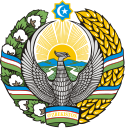Government of Uzbekistan
 Emblem of Uzbekistan | |
| Government overview | |
|---|---|
| Formed | 1 September 1991 |
| Preceding Government |
|
| Jurisdiction | Uzbekistan |
| Minister responsible | |
| Website | gov.uz |
 |
|---|
|
|
| Government |
|
The Government of the Republic of Uzbekistan (Uzbek: O'zbekiston Respublikasining Hukumati/Узбекистон Республикасининг Ҳукума��и) exercises executive power in the Republic of Uzbekistan. The members of the government are the President of Uzbekistan, Prime Minister of Uzbekistan, Ministers, and deputy ministers. It has its legal basis in the Constitution of Uzbekistan. Cabinet of Ministers - The Government of the Republic of Uzbekistan is the executive power body of the Republic of Uzbekistan, ensuring guidance over effective functioning of the economy, social and cultural development, execution of the laws, and other decisions of the Oliy Majlis, as well as decrees and resolutions issued by the President of the Republic of Uzbekistan.
Current Cabinet[]
The cabinet consists of the following members:[1]
| Cabinet of Ministers of Uzbekistan | ||
|---|---|---|
| Office | Name | Political party |
| Prime Minister | Abdulla Aripov | Liberal Democratic |
| Minister of Foreign Affairs | Abdulaziz Kamilov | - |
| Minister of Internal Affairs | - | |
| Minister of Finance | [2] | - |
| Minister of Defense | Bakhodir Kurbanov | - |
| Minister of Emergency Situations | - | |
| Minister of Justice | - | |
| - | ||
| Minister of Economic Development and Poverty Reduction | - | |
| Minister of Culture | ||
| Minister of Agriculture | - | |
| - | ||
| Minister of employment and labor relations | - | |
| - | ||
| Agrippina Shin | - | |
| - | ||
| Minister of Public Health | - | |
| [3] | - | |
| - | ||
| - | ||
| - | ||
| - | ||
| - | ||
| - | ||
| Ministry Of Tourism And Sports | Aziz Abduhakimov[4] | |
The Republic of Uzbekistan is a presidential constitutional republic, whereby the President of Uzbekistan is both head of state and head of government. Executive power is exercised by the government. Legislative power is vested in the two chambers of the Supreme Assembly, the Senate and the Legislative Chamber. The judicial branch (or judiciary), is composed of the Supreme Court, Constitutional Court, and Higher Economic Court that exercises judicial power.
The movement toward economic reform in Uzbekistan has not been matched by movement toward political reform. The government of Uzbekistan has instead tightened its grip since independence (September 1, 1991), cracking down increasingly on opposition groups. Although the names have changed, the institutions of government remain similar to those that existed before the breakup of the Soviet Union. The government has justified its restraint of public assembly, opposition parties, and the media by emphasizing the need for stability and a gradual approach to change during the transitional period, citing the conflict and chaos in the other former republics (most convincingly, neighboring Tajikistan). This approach has found credence among a large share of Uzbekistan's population, although such a position may not be sustainable in the long run.
Despite the trappings of institutional change, the first years of independence saw more resistance than acceptance of the institutional changes required for democratic reform to take hold. Whatever initial movement toward democracy existed in Uzbekistan in the early days of independence seems to have been overcome by the inertia of the remaining Soviet-style strong centralized leadership.
References[]
- ^ "The Cabinet of Ministers". GOV.UZ. Retrieved 2021-05-23.
- ^ "Тимур Ишметов стал новым министром финансов (+биография)". review.uz (in Russian). Retrieved 2021-05-23.
- ^ "Alisher Sultanov is appointed Minister of Energy".
- ^ Абдуҳакимов номзоди депутатлар томонидан туризм ва спорт вазири этиб маъқулланди bugun.uz
- Government of Uzbekistan